This report presents an assessment of the world’s largest private monitor of labour and environmental practices – PricewaterhouseCoopers (PwC). PwC performed over 6,000 factory audits in 1999, including monitoring for Nike, Disney, Walmart, the Gap, Jones Apparel, and other multinational shoe, garment, and toy companies. PwC also monitors for a number of universities and their licensees. PwC is leading the development of corporate monitoring systems and is poised to become one of the main auditors for, and most influential participants in, the Fair Labour Association and the Worldwide Responsible Apparel Production (WRAP) monitoring programs. In many ways, PwC is setting the standard for what corporate monitors will do, how they will do it, and how much they will charge.
Until now, because their reports are secret, no independent analyst has been able to evaluate the monitoring procedures of PwC or any of the other main auditing firms. This report thus presents the first detailed assessment of PwC’s monitoring methods and audit tools. The findings of this report provide clear evidence of the limitations of PwC’s monitoring systems. This should send a cautionary note to universities, manufacturers, and others considering hiring monitors or joining monitoring initiatives involving firms such as PwC.

